Difference between revisions of "DW-IO"
Jump to navigation
Jump to search
m (Add HW table) |
|||
| (11 intermediate revisions by the same user not shown) | |||
| Line 4: | Line 4: | ||
{{Infobox module | {{Infobox module | ||
| name = DW-IO.C | | name = DW-IO.C | ||
| − | | image = DW- | + | | image = DW-IO.png |
| outCount = | | outCount = | ||
| dimmOut = | | dimmOut = | ||
| Line 18: | Line 18: | ||
<!--T:3--> | <!--T:3--> | ||
| − | This module can support up to 14 buttons/reed switches/LED buttons/leak sensors/motion sensors/temperature sensors/led strips/rgb strips/ | + | This module can support up to 14 buttons/reed switches/LED buttons/leak sensors/motion sensors/temperature sensors/led strips/rgb strips/WS2812B strips. |
==Features== <!--T:4--> | ==Features== <!--T:4--> | ||
| − | * | + | *14 universal input/output channels support: |
| − | + | **Buttons | |
| + | **Reed switches | ||
| + | **LED buttons | ||
| + | **Leak sensors | ||
| + | **Motion sensors | ||
| + | **Temperature sensors | ||
| + | **Led strips | ||
| + | **3-4-5 channel rgb strips | ||
| + | **WS2812B strips. | ||
<!--T:5--> | <!--T:5--> | ||
| Line 64: | Line 72: | ||
<!--T:19--> | <!--T:19--> | ||
| − | [[File:IOC_CONN_LM.png| | + | [[File:IOC_CONN_LM.png|300px|Contactor]] |
| − | |||
==Led button scheme== <!--T:12--> | ==Led button scheme== <!--T:12--> | ||
| Line 77: | Line 84: | ||
<div class="caution">CAUTION! Output channels should only be connected using amplifier which uses 5V PWM signal from DW-IO output as input</div> | <div class="caution">CAUTION! Output channels should only be connected using amplifier which uses 5V PWM signal from DW-IO output as input</div> | ||
[[File:IOC_RGB_EX.png|500px]] | [[File:IOC_RGB_EX.png|500px]] | ||
| + | |||
| + | ==WS2812B connection scheme== <!--T:13--> | ||
| + | |||
| + | <!--T:14--> | ||
| + | [[File:IOC_CONN_WS.png|300px]] | ||
==Module parameters== <!--T:16--> | ==Module parameters== <!--T:16--> | ||
| Line 86: | Line 98: | ||
| blvoltage = 3V | | blvoltage = 3V | ||
| power = 11.5 … 27.5 V DC from CAN | | power = 11.5 … 27.5 V DC from CAN | ||
| − | | maxcur24v = | + | | maxcur24v = 30 mA |
| buttonreclen = 30m | | buttonreclen = 30m | ||
| bustype = CAN (4-wire) | | bustype = CAN (4-wire) | ||
| Line 104: | Line 116: | ||
{{indicationfw | {{indicationfw | ||
|err1 = 1 | |err1 = 1 | ||
| − | |||
|canact = 1 | |canact = 1 | ||
|canacttxt = Key pressed | |canacttxt = Key pressed | ||
| Line 131: | Line 142: | ||
*'2' - linear-dimmer | *'2' - linear-dimmer | ||
*'3'..'6' - RGB-3..6 channels | *'3'..'6' - RGB-3..6 channels | ||
| − | *'z' - | + | *'z' - WS2812B -string |
*'e' - led-button inverse | *'e' - led-button inverse | ||
| Line 138: | Line 149: | ||
*'b' - button | *'b' - button | ||
*'s' - switch | *'s' - switch | ||
| − | *'k' - contact | + | *'k' - contact |
| − | *'h' - contact | + | *'h' - contact inverse |
*'l' - leak | *'l' - leak | ||
*'n' - Neptun | *'n' - Neptun | ||
*'v' - motion inverse | *'v' - motion inverse | ||
| − | *' | + | *'m' - motion |
*'r' - thermo-resistor | *'r' - thermo-resistor | ||
*'t' - DALLAS | *'t' - DALLAS | ||
| Line 149: | Line 160: | ||
*'-' - none | *'-' - none | ||
Example: io='4---1-T-3-----' | Example: io='4---1-T-3-----' | ||
| + | |- | ||
| + | |hw||string||98||-||hw="...", where | ||
| + | *pwm_invert – PWM inverting [1, 0]; | ||
| + | *lbn_bright – brightness of led buttons, range (0 - 255); | ||
| + | *f – by default PWM frequency is 1000, range (1 - 5000). | ||
| + | Example: | ||
| + | <syntaxhighlight lang="xml" line> | ||
| + | hw="io='4---zdd----t--' pwm_invert=1 lbn_bright=255 f=1000" | ||
| + | </syntaxhighlight> | ||
|} | |} | ||
<syntaxhighlight lang="xml" line> | <syntaxhighlight lang="xml" line> | ||
| Line 157: | Line 177: | ||
<item addr="317:12" cfgid="195" name="Temperature" type="temperature-sensor"/> | <item addr="317:12" cfgid="195" name="Temperature" type="temperature-sensor"/> | ||
<item addr="317:97" cfgid="195" name="Temperature" system="yes" type="temperature-sensor"/> | <item addr="317:97" cfgid="195" name="Temperature" system="yes" type="temperature-sensor"/> | ||
| − | <item addr="317:98" cfgid="195" hw="io='4---zdd----t--'" logic-ver="19" name="Temperature" sn="1529500271" system="yes" type="temperature-sensor"/> | + | <item addr="317:98" cfgid="195" hw="io='4---zdd----t--' pwm_invert=1 lbn_bright=255 f=1000" logic-ver="19" name="Temperature" sn="1529500271" system="yes" type="temperature-sensor"/> |
<item addr="317:100" cfgid="195" name="RS232" type="com-port"/> | <item addr="317:100" cfgid="195" name="RS232" type="com-port"/> | ||
</syntaxhighlight> | </syntaxhighlight> | ||
</translate> | </translate> | ||
Latest revision as of 12:50, 5 April 2024
| DW-IO.C | |||||||
|---|---|---|---|---|---|---|---|
 | |||||||
| |||||||
14-CHANNEL INPUT/OUTPUT ADAPTER
This module can support up to 14 buttons/reed switches/LED buttons/leak sensors/motion sensors/temperature sensors/led strips/rgb strips/WS2812B strips.
Features
- 14 universal input/output channels support:
- Buttons
- Reed switches
- LED buttons
- Leak sensors
- Motion sensors
- Temperature sensors
- Led strips
- 3-4-5 channel rgb strips
- WS2812B strips.
CAUTION! All work related to the installation, connection, setting up, service and support must be carried out by qualified personnel with sufficient skills and experience in working with electrical equipment. To avoid the risk of fire, electric shock, damage to the system and/or personal injury, the system installation and assembly must be performed in accordance with the instructions listed below:
- all connectivity work must be carried out with the power turned OFF;
- use appropriate tools and personal protection against electric shock;
- do not use damaged cables, wires and connectors;
- avoid folding the cables and wires;
- do not apply excessive force to the wires by kinking or pressing them too hard: the inner conductors of the cables and wires may get stripped or damaged;
- do not use the power socket with poor contacts to connect;
- do not exceed the load limit parameters specified in the manual;
- the supply conductors wire section is subject to the specifications for current density limit, insulation type and wire material. Light section can result in cable overheating and fire.
When the power is on, NEVER:
- connect/disconnect the connectors;
- open modules and sensors.
Overview

Module dimensions
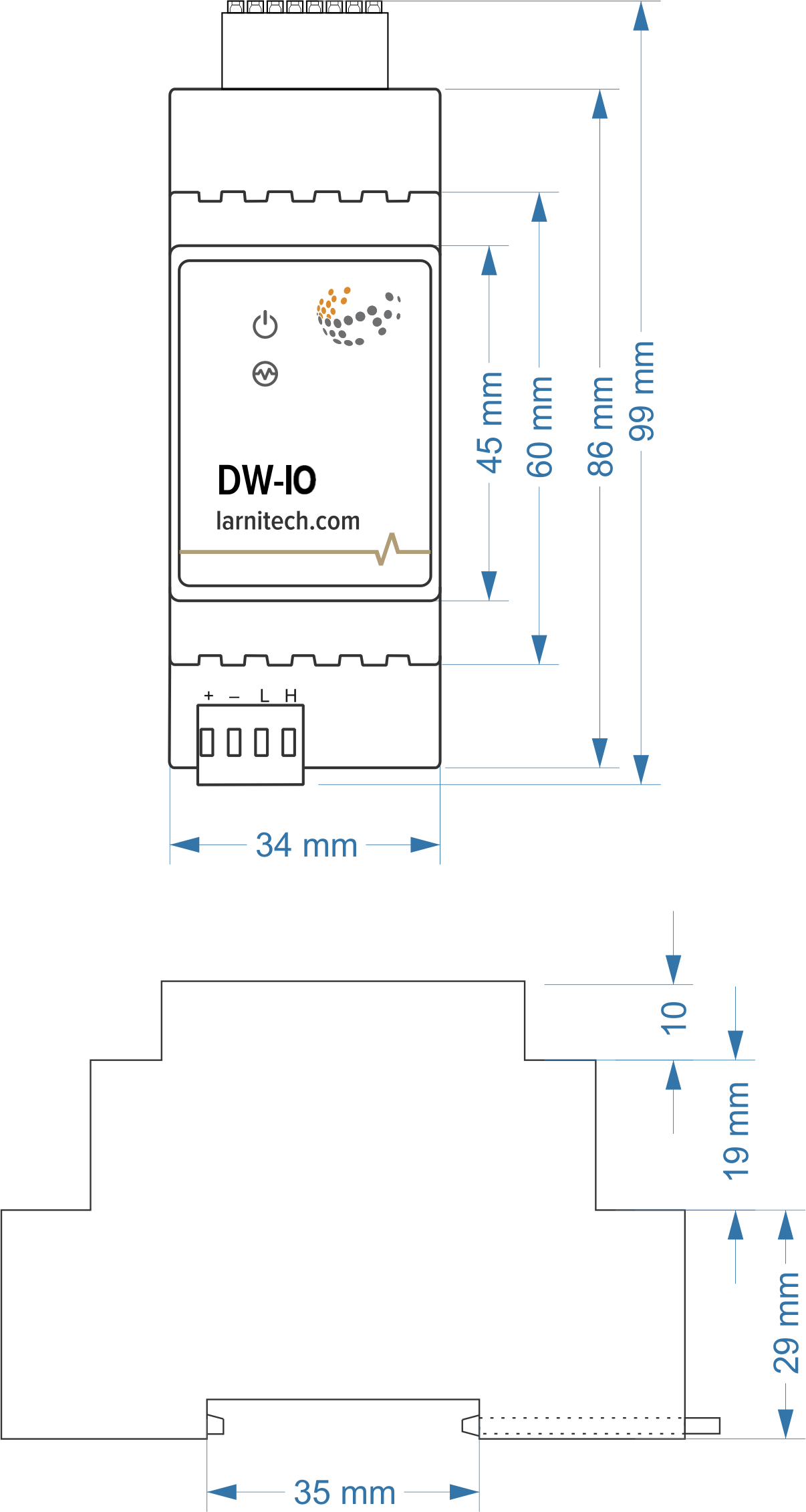
Connector
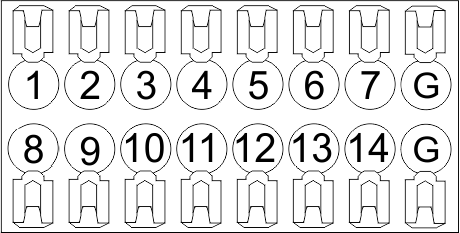
Example of temperature sensors connection
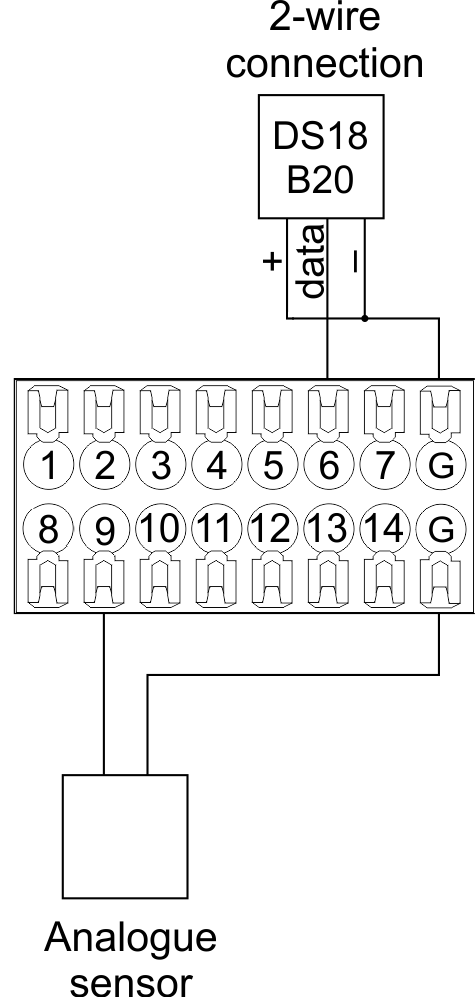
Example of motion/leakage sensors connection
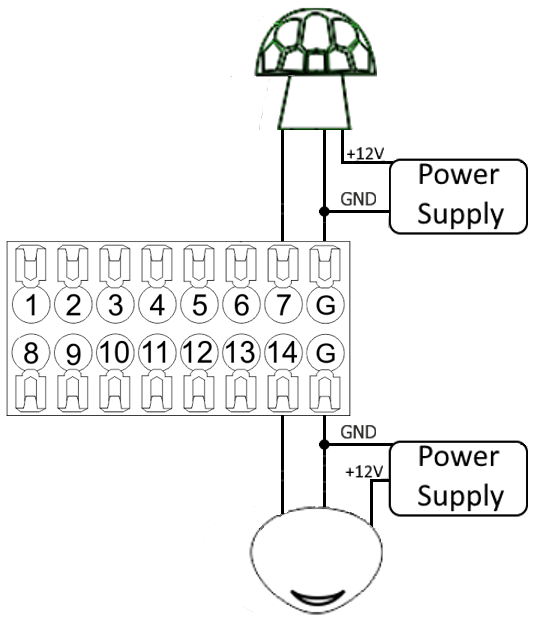
Led button scheme
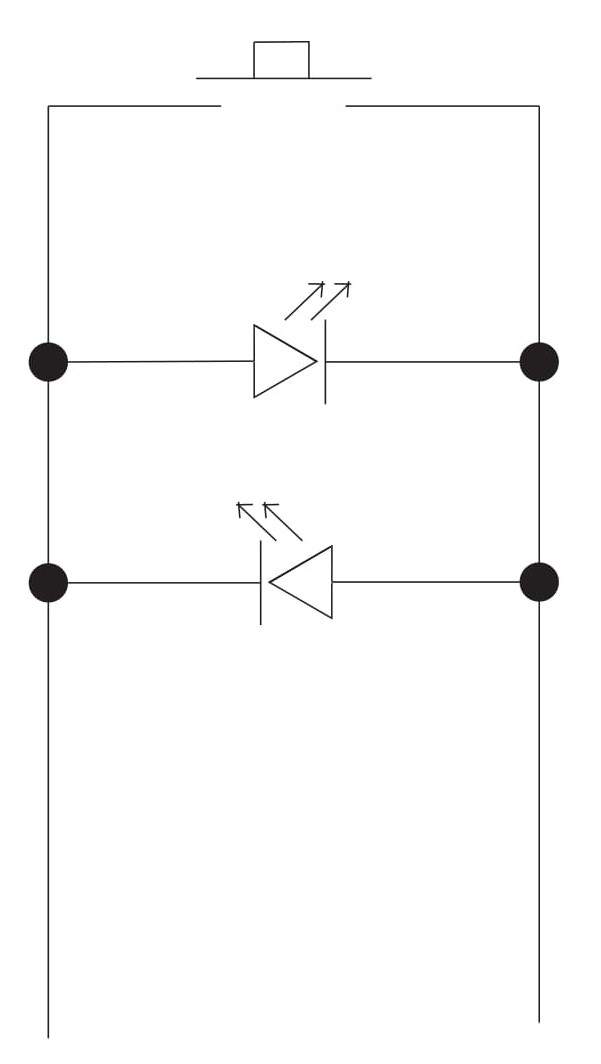
RGB connection scheme
CAUTION! Output channels should only be connected using amplifier which uses 5V PWM signal from DW-IO output as input

WS2812B connection scheme
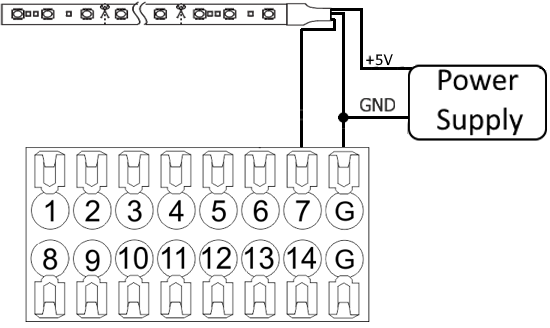
Module parameters
| Parameter name | Value |
|---|---|
| Input/output channels qty | 14 |
| Backlight voltage | 3V |
| Max load per channel | 5mA* |
| Power supply | 11.5 … 27.5 V DC from CAN |
| Max current(24V) | 30 mA |
| Push-button/reed switches line recommended length | 30m |
| Bus type | CAN (4-wire) |
| Equipment installation type | DIN rail (EN 60715) |
| Case material | ABS |
| Protection | IP40 |
| Temperature range | -10 … +50 °C |
| Size | 2U, 36x102x58 mm |
| Weight | 75g |
* - Output channels should only be connected using amplifier which uses 5V PWM signal from DW-IO output as input
Indication of module operation
Bootloader
| Indicator | Status | Description |
|---|---|---|
| Device in bootloader | ||
| Downloading firmware | ||
| Flashing firmware |
Firmware
| Indicator | Status | Description |
|---|---|---|
| Identification | ||
| Operational mode | ||
Error | ||
| Lost connection to server | ||
Activity | ||
| Key pressed |
Module installation and connection procedure
- Install the module in the switchboard on the DIN rail and fix it with the special latch on the module base.
- Connect the X1 connector.
- Connect the CAN connector.
- Configure the module using LT setup.
- Check all equipment for proper operation.
Module shut-off and deinstallation procedure
- Disconnect the CAN connector.
- Disconnect the X1 connector.
- Remove the module from the DIN rail, releasing the latch at the bottom of the module base.
HW settings
| Name | Type, range | SUBID | Default | Description |
|---|---|---|---|---|
| io | char[14] | 98 | '4---1-T-3-----' | Each char is responsible for the type of a particular channel
Example: io='4---1-T-3-----' |
| hw | string | 98 | - | hw="...", where
Example: 1hw="io='4---zdd----t--' pwm_invert=1 lbn_bright=255 f=1000"
|
1 <item addr="317:1" auto-period="600" cfgid="195" channels="4" name="RGB" type="rgb-lamp"/>
2 <item addr="317:5" auto-period="600" cfgid="195" hw="length=26 runtime=5" name="RGB" type="rgb-lamp"/>
3 <item addr="317:6" cfgid="195" name="Switch" type="switch"/>
4 <item addr="317:7" cfgid="195" name="Switch" type="switch"/>
5 <item addr="317:12" cfgid="195" name="Temperature" type="temperature-sensor"/>
6 <item addr="317:97" cfgid="195" name="Temperature" system="yes" type="temperature-sensor"/>
7 <item addr="317:98" cfgid="195" hw="io='4---zdd----t--' pwm_invert=1 lbn_bright=255 f=1000" logic-ver="19" name="Temperature" sn="1529500271" system="yes" type="temperature-sensor"/>
8 <item addr="317:100" cfgid="195" name="RS232" type="com-port"/>